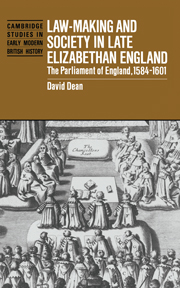Book contents
- Frontmatter
- Contents
- Acknowledgements
- Note to the reader
- List of abbreviations
- Introduction
- 1 Initiation and procedure
- 2 Supply and the general pardon
- 3 The crown and the state
- 4 Religion and the church
- 5 The commonweal
- 6 Law reform
- 7 Private legislation
- 8 Expiring laws continuance acts
- Epilogue: the Parliament of 1604
- Conclusion
- Index of acts
- Index of bills
- General index
7 - Private legislation
Published online by Cambridge University Press: 14 September 2009
- Frontmatter
- Contents
- Acknowledgements
- Note to the reader
- List of abbreviations
- Introduction
- 1 Initiation and procedure
- 2 Supply and the general pardon
- 3 The crown and the state
- 4 Religion and the church
- 5 The commonweal
- 6 Law reform
- 7 Private legislation
- 8 Expiring laws continuance acts
- Epilogue: the Parliament of 1604
- Conclusion
- Index of acts
- Index of bills
- General index
Summary
In the famous beginning to the second book of De Republica Anglorum, the celebrated Elizabethan secretary and ambassador, Sir Thomas Smith, declared that parliament ‘abrogateth olde lawes, maketh newe, giveth orders for thinges past, and for thinges hereafter to be followed’. In his catalogue of all the things parliaments did, Smith first named the changing of ‘rightes, and possessions of private men’. The legislative product of such concerns were private bills and these were of two sorts: those which pertained to individuals and those concerning one or more localities. Measures for individuals enjoyed a good success rate in the last six parliaments of Elizabeth's reign. Of the 87 bills for individuals initiated, 44 (57 per cent) were successful compared with only 22 of 105 local bills (21 per cent). Together comprising about one third of the legislation introduced, both types took up a good deal of time in every parliamentary session.
BILLS FOR INDIVIDUALS
Attainder and restitution
There were two acts of restitution and one act of attainder passed in the last six parliaments of Elizabeth's reign. Lord Thomas Howard, son of Thomas, fourth Duke of Norfolk executed in 1572 for his complicity with Mary, Queen of Scots, was restored in 1584–5 to both his blood and property. This was a grace bill, entering the upper house with the Queen's signature; it passed both houses in four days, and even this included a delay because the Lords had wrongly endorsed it.
- Type
- Chapter
- Information
- Law-Making and Society in Late Elizabethan EnglandThe Parliament of England, 1584–1601, pp. 217 - 258Publisher: Cambridge University PressPrint publication year: 1996

